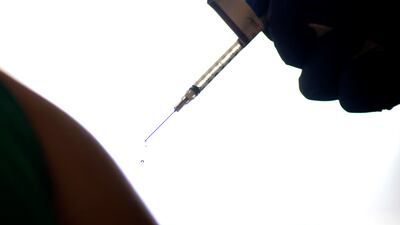A rise in the use of an unauthorised flu vaccine in Egypt is causing concern among medical professionals, with the Health Ministry warning the public that the shot could be life-threatening.
A cocktail of antibiotics, painkillers and the steroid — dubbed the “Hitler shot” — has risen in popularity over the past few weeks, particularly in Egypt’s rural provinces as Covid-19 infection rates rise.
The increased use of the shot, which is administered typically without a doctor’s prescription or supervision, has raised questions about pharmaceutical practices in Egypt and the ease-of-access citizens have to potentially dangerous medications.
On Sunday, the country's Health Ministry issued a warning on its Facebook page, cautioning people against taking the shot.
Dr Ahmed Doma, a member of the country’s pharmacists’ syndicate, called popular Egyptian talk show El Hekaya on Sunday to condemn medical malpractice in Egypt.
He said many people administering the shots were not pharmacists but most likely sales clerks hired by pharmacy owners.
“The Hitler shot has been around for a while and we in the medical community have been aware of it for some time," Dr Doma said. "It is perhaps garnering more attention now because people are using it more amid a recent spike in cases of the flu and mild bouts of Covid-19.”
In rural provinces, it can be easier for unregulated practices to take place, Dr Doma said.
He said the shot was particularly dangerous to patients with allergies or chest problems, many of whom might not know they have them, and that cortisone can cause a drop in a patient’s immune response, which can be life-threatening.
“Egyptians deal with pharmaceuticals in a way that is unheard of in most other countries in the world,” Dr Doma said. "They enjoy a very intimate relationship with their medication.
“Unfortunately, much of the time Egyptian patients are given free access to medications that should only be administered by a doctor.”
Health Ministry spokesman Hossam Abdel Ghaffar called talk show Yahdoth Fe Masr on Sunday to warn against taking the shot.
He said those people taking the injection could also suffer from anaphylactic shock, which can occur when a person is given a particularly high dose of an antibiotic intravenously.
Mr Ghaffar said the shot could be fatal because of uncontrolled dosages and the absence of a medical professional, should complications arise.
The trend has also raised concerns among some medical professionals over the use of antibiotics in Egypt, where they are often prescribed for illnesses unrelated to bacteria, the microbe targeted by antibiotics.
Many say that, amid the rise of antibiotic-resistant "super bacteria", prescription practices should be regulated more strictly.


